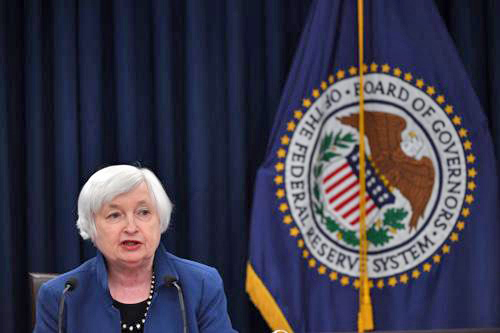China remains confident despite US interest rate hike

The US Federal Reserve Chair Janet Yellen speaks during a news conference after the Fed’s decision to raise overnight interest rates by 25 basis points on March 15.
The US Federal Reserve recently raised overnight interest rates by 25 basis points. In response, scholars from China’s Academy of Macroeconomic Research gathered to discuss spillover effects of the move.
“The fact that the entire world pays close attention to the Fed’s decision to increase interest rates is evidence of the extent of economic globalization,” said Bai Hejin, a research fellow from the academy. The process of economic globalization “remains unchanged regardless of the government transition of the United States,” Bai added.
The announcement conforms to the market anticipation and has not caused massive chaos. “In the short term, the market has reacted positively to the Fed’s expected increase of interest rates so far,” said Yao Shumei, a research fellow from the Institute for International Economic Research at the academy.
Higher interest rates can benefit exports while raising the cost of imports. There will be greater pressure in terms of paying foreign debt. Where cross-border capital flows are concerned, raising interest rates creates a tendency for speculative short-term capital to retreat from the emerging countries.
“But when it becomes impossible to handle, massive capital will rush to the American market for arbitrage and create critical effects. To counter it, China should seize the opportunity and alleviate negative effects by appropriate means,” Bai suggested.
“It remains uncertain whether the Fed will continue to raise interest rates,” said Zhang Liqun, a research fellow from the Development Research Center of the State Council. The United States’ economy is gradually recovering, but external circumstances are still tight. Also, Trump’s policy on tax and infrastructure investment requires more government debt. At this point, a loose monetary environment is desired, which goes against the current policy, Zhang added.
In 2017, such statistics as fixed-asset investment and foreign trade show that the Chinese economy is progressing with stability. “The domestic economy in the future tends to be more stable and healthy,” Zhang said. Instead of overreaction, we need to actively adjust monetary policy based on domestic conditions, he explained.
In terms of the impact of the recent rate increase on China, the academy’s research fellow Ma Xiaohe argued that it will influence the domestic economy due to China’s export-intensive economic pattern. However, China is increasingly capable of tackling such issues, and its adjustment has become much more effective.
Ma suggested further boosting the flexibility and elasticity of the RMB exchange rate and facilitating supply-side structural reform. Also, China needs to prevent financial risks, particularly potential impacts brought by the combination of imported inflation and ever-growing domestic prices.
Zang Yueru, director of the Institute for Market and Price at the academy, said China should stick to its current strategies and tackle the impact of the Fed’s move on the domestic market without haste. In the long run, China should continue to transform its economic pattern.
Also, China should be determined to reform the financial system while stabilizing growth. In the short term, the country should stick to stable monetary policies and drive capital into the real economy. At the same time, rate increases may hinder the process of deleveraging, so risks should be prevented. The nation should be confident about the sustainability of economic growth, Zang suggested.
